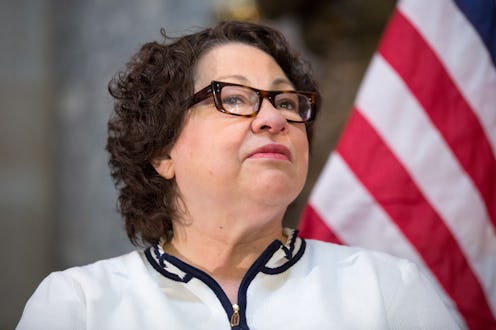News
Sonia Sotomayor Just Wrote A Scathing Dissent In A Crucial Voting Rights Case

The Supreme Court upheld an Ohio law that kicks voters off registration rolls on Monday, but Justice Sonia Sotomayor's dissent in the voting rights case offered a scathing rebuttal. The justices voted 5-4 in favor of an Ohio policy that revokes a resident's voter registration if she doesn't vote for two years and fails to respond to state election officials. Sotomayor, on the other hand, argued that law is part of "concerted state efforts to prevent minorities from voting."
The policy in question was struck down by a lower court for violating the National Voter Registration Act (NVRA), which prohibits states from removing voters from registration lists just because they didn't vote. However, the Supreme Court ruled that Ohio's program didn't violate the 1993 law since it removes voters after they fail to respond to a to a change-of-residence notice.
Justice Samuel Alito wrote in the majority opinion that the high court wasn't deciding whether the policy was "the ideal method for keeping its voting rolls up to date," just whether it was legal.
Sotomayor disagreed. "It entirely ignores the history of voter suppression against which the NVRA was enacted and upholds a program that appears to further the very disenfranchisement of minority and low-income voters that Congress set out to eradicate," she wrote. "States, though, need not choose to be so unwise."
Sotomayor, notably the first Hispanic Supreme Court justice, called Monday’s ruling "blatant unfairness" and encouraged minority communities and their allies to take a stand against state efforts to limit who can vote. As she put it:
Communities that are disproportionately affected by unnecessarily harsh registration laws should not tolerate efforts to marginalize their influence in the political process, nor should allies who recognize blatant unfairness stand idly by. Today’s decision forces these communities and their allies to be even more proactive and vigilant in holding their States accountable and working to dismantle the obstacles they face in exercising the fundamental right to vote.
She further explained that Ohio's voter purges burden the rights of voters and introduce unnecessary obstacles:
At best, purged voters are forced to "needlessly reregister" if they decide to vote in a subsequent election; at worst, they are prevented from voting at all because they never receive information about when and where elections are taking place.
The state of Ohio argued that it needs to remove infrequent voters in order to clean up its registration rolls. Justice Alito agreed, citing a 2012 report from the Pew Center on the States estimating that roughly 24 million voter registrations in the United States are either invalid or inaccurate.
Offering another view, Sotomayor cited a brief submitted by the National Association for the Advancement of Colored People showing how voter purges disproportionately affect minorities:
As one example, amici point to an investigation that revealed that in Hamilton County, "African-American-majority neighborhoods in downtown Cincinnati had 10% of their voters removed due to inactivity" since 2012, as "compared to only 4% of voters in a suburban, majority-white neighborhood."
Sotomayor's overarching point was that purging registration rolls is counterproductive for democratic elections. She wrote:
Our democracy rests on the ability of all individuals, regardless of race, income, or status, to exercise their right to vote. The majority of States have found ways to maintain accurate voter rolls without initiating removal processes based solely on an individual’s failure to vote.
Although her scathing dissent doesn't change the outcome of the Supreme Court's decision, she laid the foundation for future lawsuits to assert that voter purges like Ohio's discriminate against minorities. After all, justices write dissenting opinions for a reason — and Sotomayor's could be useful in prospective voting rights cases.